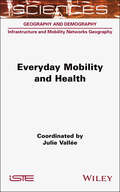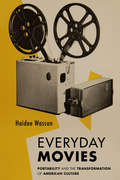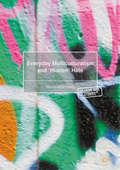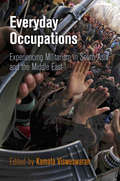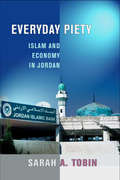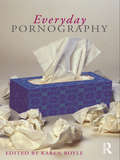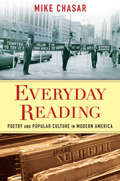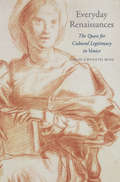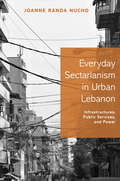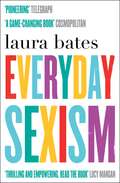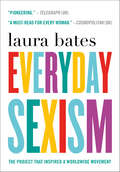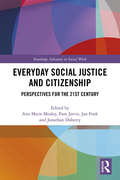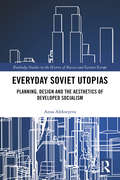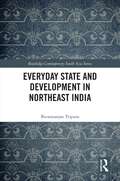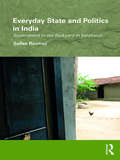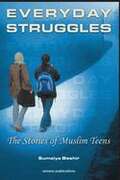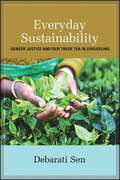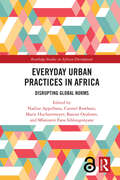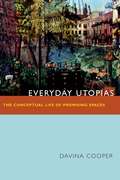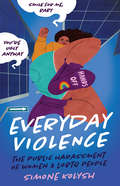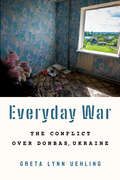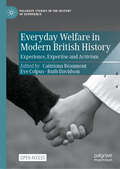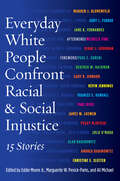- Table View
- List View
Everyday Mobility and Health (ISTE Consignment)
by Julie ValléeEveryday mobility is neither favorable nor unfavorable to health. While it can facilitate social interactions, increase access to remote services, or encourage physical activity, it can also generate pollution, promote the spread of epidemics or cause traffic accidents. This book presents different facets of the relationship between daily mobility and health, focusing on the environments (geographical, social and political) that people live and move around in. It analyzes the role of mobility in the mechanisms of environmental exposure and diffusion, as well as the resulting health inequalities. It deals with active modes of travel (mainly walking and cycling) and the local contexts that are conducive to them. Finally, it offers a critical reading of the place given to everyday mobility in policies to combat obesity and rationalize regional healthcare provision.
Everyday Movies: Portable Film Projectors and the Transformation of American Culture
by Haidee WassonEveryday Movies documents the twentieth-century rise of portable film projectors. It demonstrates that since World War II, the vast majority of movie-watching did not happen in the glow of the large screen but rather took place alongside the glitches, distortions, and clickety-clack of small machines that transformed home, classroom, museum, community, government, industrial, and military venues into sites of moving-image display. Reorienting the history of cinema away from the magic of the movie theater, Haidee Wasson illustrates the remarkable persistence and proliferation of devices that fundamentally rejected the sleek, highly professionalized film show. She foregrounds instead another kind of apparatus, one that was accessible, affordable, adaptable, easy to use, and crucially, programmable. Revealing rich archival discoveries, this book charts a compelling and original history of film that brings to light new technologies and diverse forms of media engagement that continue to shape contemporary life.
Everyday Multiculturalism and ‘Hidden’ Hate
by Stevie-Jade HardyThis book examines the lived reality of 'everyday multiculturalism', and the ways that young people make sense of the diverse world around them. Currently we know very little about how multiculturalism shapes our lives, our interactions and our identity. This is especially pertinent for young people. How do young people from largely white, disadvantaged backgrounds interpret multiculturalism? How do they engage with people from 'different' minority ethnic and faith communities? How do they negotiate the challenges that arise within ever-diversifying environments? Drawing on empirical research, Stevie-Jade Hardy uncovers the fears and tensions that both undermine, and are caused by, doing multiculturalism. In doing so, she shines a light on the 'hidden' phenomenon of youth hate crime perpetration. This book will be of particular interest to scholars of criminology, sociology and cultural studies, as well as to professionals and policy-makers working in the fields of diversity and hate crime.
Everyday Occupations
by Kamala VisweswaranIn the twenty-first century, political conflict and militarization have come to constitute a global social condition rather than a political exception. Military occupation increasingly informs the politics of both democracies and dictatorships, capitalist and formerly socialist regimes, raising questions about its relationship to sovereignty and the nation-state form. Israel and India are two of the world's most powerful postwar democracies yet have long-standing military occupations. Pakistan, Bangladesh, and Turkey have passed through periods of military dictatorship, but democracy has yielded little for their ethnic minorities who have been incorporated into the electoral process. Sri Lanka and Bangladesh (like India, Pakistan, and Turkey) have felt the imprint of socialism; declarations of peace after long periods of conflict in these countries have not improved the conditions of their minority or indigenous peoples but rather have resulted in "violent peace" and remilitarization. Indeed, the existence of standing troops and ongoing state violence against peoples struggling for self-determination in these regions suggests the expanding and everyday nature of military occupation. Such everydayness raises larger issues about the dominant place of the military in society and the social values surrounding militarism.Everyday Occupations examines militarization from the standpoints of both occupier and occupied. With attention to gender, poetics, satire, and popular culture, contributors who have lived and worked in occupied areas in the Middle East and South Asia explore what kinds of society are foreclosed or made possible by militarism. The outcome is a powerful contribution to the ethnography of political violence.Contributors: Nosheen Ali, Kabita Chakma, Richard Falk, Sandya Hewamanne, Mohamad Junaid, Rhoda Kanaaneh, Hisyar Ozsoy, Cheran Rudhramoorthy, Serap Ruken Sengul, Kamala Visweswaran.
Everyday Piety: Islam and Economy in Jordan
by Sarah A. TobinWorking and living as an authentic Muslim--comporting oneself in an Islamically appropriate way--in the global economy can be very challenging. How do middle-class Muslims living in the Middle East navigate contemporary economic demands in a distinctly Islamic way? What are the impacts of these efforts on their Islamic piety? To what authority does one turn when questions arise? What happens when the answers vary and there is little or no consensus? To answer these questions, Everyday Piety examines the intersection of globalization and Islamic religious life in the city of Amman, Jordan. Drawing on in-depth ethnographic fieldwork in Amman, Sarah A. Tobin demonstrates that Muslims combine their interests in exerting a visible Islam with the opportunities and challenges of advanced capitalism in an urban setting, which ultimately results in the cultivation of a "neoliberal Islamic piety." Neoliberal piety, Tobin contends, is created by both Islamizing economic practices and economizing Islamic piety, and is done in ways that reflect a modern, cosmopolitan style and aesthetic, revealing a keen interest in displays of authenticity on the part of the actors. Tobin highlights sites at which economic life and Islamic virtue intersect: Ramadan, the hijab, Islamic economics, Islamic banking, and consumption. Each case reflects the shift from conditions and contexts of highly regulated and legalized moral behaviors to greater levels of uncertainty and indeterminacy. In its ethnographic richness, this book shows that actors make normative claims of an authentic, real Islam in economic practice and measure them against standards that derive from Islamic law, other sources of knowledge, and the pragmatics of everyday life.
Everyday Pornography
by Karen BoylePublic and academic debate about ‘porn culture’ is proliferating. Ironically, what is often lost in these debates is a sense of what is specific about pornography. By focusing on pornography’s mainstream – contemporary commercial products for a heterosexual male audience – Everyday Pornography offers the opportunity to reconsider what it is that makes pornography a specific form of industrial practice and genre of representation. Everyday Pornography presents original work from scholars from a range of academic disciplines (Media Studies, Law, Sociology, Psychology, Women’s Studies, Political Science), introducing new methodologies and approaches whilst reflecting on the ongoing value of older approaches. Among the topics explored are: the porn industry’s marketing practices (spam emails, reviews) and online organisation commercial sex in Second Life the pornographic narratives of phone sex and amateur videos the content of best-selling porn videos how the male consumer is addressed by pornography, represented within the mainstream, understood by academics and contained by legislation. This collection places a particular emphasis on anti-pornography feminism, a movement which has been experiencing a revival since the mid-2000s. Drawing on the experiences of activists alongside academics, Everyday Pornography offers an opportunity to explore the intellectual and political challenges of anti-pornography feminism and consider its relevance for contemporary academic debate.
Everyday Reading: Poetry and Popular Culture in Modern America
by Mike ChasarExploring poetry scrapbooks, old-time radio show recordings, advertising verse, corporate archives, and Hallmark greeting cards, among other unconventional sources, Mike Chasar casts American poetry as an everyday phenomenon consumed and created by a vast range of readers. He shows how American poetry in the first half of the twentieth century and its reception helped set the stage for the dynamics of popular culture and mass media today. Poetry was then part and parcel of American popular culture, spreading rapidly as the consumer economy expanded and companies exploited its profit-making potential. Poetry also offered ordinary Americans creative, emotional, political, and intellectual modes of expression, whether through scrapbooking, participation in radio programs, or poetry contests. Reenvisioning the uses of twentieth-century poetry, Chasar provides a richer understanding of the innovations of modernist and avant-garde poets and the American reading public's sophisticated powers of feeling and perception.
Everyday Renaissances: The Quest For Cultural Legitimacy In Venice (I Tatti studies in Italian Renaissance history #18)
by Sarah Gwyneth RossRevealing an Italian Renaissance beyond Michelangelo and the Medici, Sarah Gwyneth Ross recovers the experiences of everyday people who were inspired to pursue humanistic learning. Physicians were often the most avid professionals seeking to earn the respect of their betters, advance their families, and secure honorable remembrance after death.
Everyday Sectarianism in Urban Lebanon: Infrastructures, Public Services, and Power
by Joanne Randa NuchoWhat causes violent conflicts around the Middle East? All too often, the answer is sectarianism--popularly viewed as a timeless and intractable force that leads religious groups to conflict. In Everyday Sectarianism in Urban Lebanon, Joanne Nucho shows how wrong this perspective can be. Through in-depth research with local governments, NGOs, and political parties in Beirut, she demonstrates how sectarianism is actually recalibrated on a daily basis through the provision of essential services and infrastructures, such as electricity, medical care, credit, and the planning of bridges and roads.Taking readers to a working-class, predominantly Armenian suburb in northeast Beirut called Bourj Hammoud, Nucho conducts extensive interviews and observations in medical clinics, social service centers, shops, banking coops, and municipal offices. She explores how group and individual access to services depends on making claims to membership in the dominant sectarian community, and she examines how sectarianism is not just tied to ethnoreligious identity, but also class, gender, and geography. Life in Bourj Hammoud makes visible a broader pattern in which the relationships that develop while procuring basic needs become a way for people to see themselves as part of the greater public.Illustrating how sectarianism in Lebanon is not simply about religious identity, as is commonly thought, Everyday Sectarianism in Urban Lebanon offers a new look at how everyday social exchanges define and redefine communities and conflicts.
Everyday Sexism: The Project That Inspired A Worldwide Movement
by Laura Bates'If Caitlin Moran's How To Be A Womanis the fun-filled manual for female survival in the 21st century, everyday sexism is its more politicised sister' (Independent on Sunday). <P><P>After experiencing a series of escalating sexist incidents, Laura Bates started the everyday sexism project and has gone on to write 'a pioneering analysis of modern day misogyny' (Telegraph).After an astounding response from the wide range of stories that came pouring in from all over the world, the project quickly became one of the biggest social media success stories of the internet. From being harassed and wolf-whistled at on the street, to discrimination in the workplace and serious sexual assault, it is clear that sexism had become normalised. <P><P> But Bates inspires women to lead a real change and writes this 'extremely powerful book that could, and should, win hearts and minds right across the spectrum' (Financial Times). Often shocking, sometimes amusing and always poignant, everyday sexism is a protest against inequality and a manifesto for change. It's 'a game-changing book, a must-read for every woman' (Cosmopolitan).'Admirable and culturally transferable. "A storm is coming," writes Bates. After reading this book you'll hope so' (Independent). Welcome to the fourth wave of feminism.
Everyday Sexism: The Project that Inspired a Worldwide Movement
by Laura Bates“Laura Bates has challenged the normalization of sexism, and created a place where both men and women can see it and change it.” —Gloria SteinemThe Everyday Sexism Project was founded by writer and activist Laura Bates in April 2012. It began life as a website where people could share their experiences of daily, normalized sexism, from street harassment to workplace discrimination to sexual assault and rape.The Project became a viral sensation, attracting international press attention from The New York Times to French Glamour,Grazia South Africa, to the Times of India and support from celebrities such as Rose McGowan, Amanda Palmer, Mara Wilson, Ashley Judd, James Corden, Simon Pegg, and many others. The project has now collected over 100,000 testimonies from people around the world and launched new branches in twenty-five countries worldwide. Everyday Sexism has been credited with helping to spark a new wave of feminism.“Laura Bates didn’t just begin a movement, she has started a revolution.” —Liz Plank, Senior Correspondent at Mic and host of Flip the Script“A startlingly astute analysis on violence and inequality.” —Lauren Wolfe, journalist and Director of the Women’s Media Center’s Women Under Siege Project“Powerful.” —Stephen Dunbar-Johnson, President of International at The New York Times“Pioneering.” —Telegraph“A must-read for every woman.” —Cosmopolitan (UK)“This is an important work and if I had my way would be compulsory school reading across the globe.” —Feminist Times“Laura Bates deftly makes visible the spider web of oppression that holds us back and binds us all together.” —Jaclyn Friedman, co-author of Yes Means Yes: Visions of Female Sexual Power and a World Without Rape
Everyday Silence and the Holocaust
by Irene LevinEveryday Silence and the Holocaust examines Irene Levin’s experiences of her family’s unspoken history of the Holocaust and the silence that surrounded their war experiences as non-topics.A central example of what C. Wright Mills considered the core of sociology – the intersection of biography and history – the book covers the process by which the author came to understand that notes found in her mother’s apartment following her death were not unimportant scribbles, but in fact contained elements of her mother’s biographical narrative, recording her parents’ escape from occupied Norway to unoccupied Sweden in late 1942. From the mid-1990s, when society began to open up about the atrocities committed against the Jews, so too did the author find that her mother and the wider Jewish population ceased to be silent about their war experiences and began to talk. Charting the process by which the author traced the family’s broader history, this book explores the use of silence, whether in the family or in society more widely, as a powerful analytic tool and examines how these silences can intertwine. This book provides insight into social processes often viewed through a macro-historical lens by way of analysis of the life of an "ordinary" Jewish woman as a survivor.An engaging, grounded study of the biographical method in sociology and the role played by silence, this book will appeal to readers with an interest in the Holocaust and World War II, as well as in social scientific research methods. It will be of use to both undergraduate and postgraduate scholars in the fields of history, social science, psychology, philosophy, and the history of ideas.The Open Access version of this book, available at http://www.taylorfrancis.com, has been made available under a Creative Commons [Attribution-Non Commercial-No Derivatives (CC-BY-NC-ND)] 4.0 license.
Everyday Social Justice and Citizenship: Perspectives for the 21st Century (Routledge Advances in Social Work)
by Jan Fook Jonathan Doherty Pam Jarvis Ann Marie MealeySocial justice is a concept which is widely touted and lauded as desirable, yet its meaning may differ depending on whether its focus is on the underlying values of social justice, the more specific objectives these entail, or the actual practices or policies which aim to achieve social justice. In the current global political context, we need to re-examine what we mean by social justice, and demonstrate that "making a difference" and contributing to human flourishing is more achievable than this context would suggest. The book aims to increase our sense of being able to enact social justice, by showcasing different ways of contributing to social justice, and "making a difference" in different settings and different ways. Part 1 introduces a fluid and contextual approach to social justice. Part 2 examines social justice and faith perspectives, such as Christianity, Judaism, Islam and community organisations. Part 3 illustrates perspectives on children, the family, sport and local government. Part IV provides perspectives of social justice in education. Considering concepts of citizenship and social justice from a variety of contemporary perspectives, Everyday Social Justice and Citizenship should be considered essential reading for academics and students from a range of social scientific disciplines with an interest in social justice, as well as those working in education, community work, youth work and chaplaincy.
Everyday Soviet Utopias: Planning, Design and the Aesthetics of Developed Socialism (Routledge Studies in the History of Russia and Eastern Europe)
by Anna AlekseyevaThis book explores how intellectuals of the later Soviet decades – the 1970s and 1980s – sought to bring about the socialist utopian world. It argues that the last two decades of the Soviet Union were not characterised by state withdrawal and malaise, as some scholars have argued; attempts to envisage and enact Utopia remained as imaginative and creative as ever. The book considers what these utopian ideas looked like through housing schemes, layouts of districts and cities, design of objects and interiors, and proposals for the organisation of family and social life. Relating developments in the Soviet Union to evolving social theory and postmodernism more broadly, the book draws transnational parallels between the intellectual history of east and west in the late twentieth century.
Everyday State and Development in Northeast India (Routledge Contemporary South Asia Series)
by Biswaranjan TripuraThis book examines the everyday state from the perspective of the lived experiences of peripheralized Indigenous tribal peoples in contemporary Tripura, Northeast India.Building on discussions in the anthropology of the state and development literature and based on rich ethnography data, this book examines the concrete rural Indigenous people’s experiences of the state and how they negotiate those interactions to their advantage and for their own empowerment. The author addresses the following questions: How do members of peripheralized Indigenous tribal communities imagine, perceive, and experience the state in their everyday practices? What are the various strategies and approaches that they use to undermine and negotiate the complex power relations to their advantage in their relations with the state? This book argues that the state is experienced as both hope and despair and broken promises by the peripheralized Indigenous community.A fresh perspective of studying Indigenous/tribal in Northeast India, this book will be useful for researchers and scholars of the anthropology of state and development, development studies, social work, sociology, political science, tribal/ Adivasi/Indigenous studies, Northeast India studies, and South Asian studies.
Everyday State and Politics in India: Government in the Backyard in Kalahandi (Routledge/Edinburgh South Asian Studies Series)
by Sailen RoutrayThe Kalahandi district in the state of Odisha in Eastern India is regarded as an iconic region of underdevelopment, and is often perceived to be the ‘Somalia’ of the country. It is also the site of a large number of governmental interventions.This book focuses on processes of governance in Odisha, and provides an ethnographic account of the changing forms of governmental actions in Kalahandi by analysing the implementation of WORLP (Western Orissa Rural Livelihoods Project), a new generation watershed development project. The book also shows the morphings of the forms of the state on the ground, and the ways in which it is perceived by the agents and objects of statist actions. Arguing that changes in the institutions and practices of the state in India over the last three decades are better understood through the conceptualisation of state-fabrication, rather than of state-formation, the author describes the governmental tactics related to emergent modes of governmental action. The book identifies an increasing convergence in the everyday practices of governmental and non-governmental organisations, and the growth of ‘the social’ as a terrain and object of governmental actions, as two important effects of the process of deployment of these tactics. It argues that the vernacular sphere of toutary is a key domain of sociality that frames the perceptions and actions of people related to the state in Odisha. As a domain, toutary is populated by social agents, called touters; toutary can be understood as the interstitial zone between state and society shaped by the increasing penetration by the state into society through social technologies.By providing an alternative analysis of state and politics in India, this book adds to the literature surrounding the everyday state by illuminating recent changes in state-society relations. It will be of interest to academics in the field of Political Science, Public Policy, Development Studies, Social Anthropology/Sociology, Social Work, and South Asian studies.
Everyday Struggles: The Stories of Muslim Teens
by Sumaiya BeshirThis is a collection of stories of Muslim teens and their peers.
Everyday Sustainability: Gender Justice and Fair Trade Tea in Darjeeling (SUNY series, Praxis: Theory in Action)
by Debarati SenHonorable Mention, 2019 Michelle Z. Rosaldo Prize presented by the Association for Feminist AnthropologyWinner of the 2018 Gloria E. Anzaldúa Book Prize presented by the National Women's Studies AssociationWinner of the 2018 Global Development Studies Book Award presented by the Global Development Studies Section of the International Studies AssociationEveryday Sustainability takes readers to ground zero of market-based sustainability initiatives—Darjeeling, India—where Fair Trade ostensibly promises gender justice to minority Nepali women engaged in organic tea production. These women tea farmers and plantation workers have distinct entrepreneurial strategies and everyday practices of social justice that at times dovetail with and at other times rub against the tenets of the emerging global morality market. The author questions why women beneficiaries of transnational justice-making projects remain skeptical about the potential for economic and social empowerment through Fair Trade while simultaneously seeking to use the movement to give voice to their situated demands for mobility, economic advancement, and community level social justice.SUNY Press has collaborated with Knowledge Unlatched to unlock KU Select titles. The Knowledge Unlatched titles have been made open access through libraries coming together to crowd fund the publication cost. Each monograph has been released as open access making the eBook freely available to readers worldwide. Discover more about the Knowledge Unlatched program here: https://www.knowledgeunlatched.org/, and access the book online at the SUNY Open Access Repository at <a href="https://soar.suny.edu/handle/20.500.12648/8447 ">https://soar.suny.edu/handle/20.500.12648/8447 .
Everyday Urban Practices in Africa: Disrupting Global Norms (Routledge Studies in African Development)
by Nadine Appelhans Basirat Oyalowo Carmel Rawhani Marie Huchzermeyer Mfaniseni Fana SihlongonyaneThis book disrupts the dominant underlying international norms informing urban development strategies across African cities. International policy frameworks have created a new universal agenda for developing cities. However, these frameworks have also imposed global paradigms and discourses that are often in conflict with local urbanisms. As we approach the deadline for achieving the Sustainable Development Goals, there is need for reflection and deliberation on a post-2030 agenda.The authors identify powerful assumptions, norms, and positionalities that obfuscate the efforts to achieve sustainable development in African cities, as well as along the North–South divide. They argue that a disruptive critique of these normative concepts, grounded in the lived African urban everyday, opens up opportunities to dismantle their assumed neutrality. Through disruption, the authors critically re-interpret the meanings of policy and the praxis of local urbanism, ultimately challenging the logic of universalising concepts underpinning implementation in the current international policy system, and asserting the need for contextualised urban policies.The book will be of interest to scholars and students of urban studies, development planning, urban governance, human settlements, development studies, urban geography, and African studies. It will also be useful for practitioners including town and regional/urban planners, urban policy consultants, and international development cooperation agencies.The Open Access version of this book, available at http://www.taylorfrancis.com, has been made available under a Creative Commons Attribution-Non Commercial-No Derivatives (CC-BY-NC-ND) 4.0 license.
Everyday Utopias: The Conceptual Life of Promising Spaces
by Davina CooperEveryday utopias enact conventional activities in unusual ways. Instead of dreaming about a better world, participants seek to create it. As such, their activities provide vibrant and stimulating contexts for considering the terms of social life, of how we live together and are governed. Weaving conceptual theorizing together with social analysis, Davina Cooper examines utopian projects as seemingly diverse as a feminist bathhouse, state equality initiatives, community trading networks, and a democratic school where students and staff collaborate in governing. She draws from firsthand observations and interviews with participants to argue that utopian projects have the potential to revitalize progressive politics through the ways their innovative practices incite us to rethink mainstream concepts including property, markets, care, touch, and equality. This is no straightforward story of success, however, but instead a tale of the challenges concepts face as they move between being imagined, actualized, hoped for, and struggled over. As dreaming drives new practices and practices drive new dreams, everyday utopias reveal how hard work, feeling, ethical dilemmas, and sometimes, failure, bring concepts to life.
Everyday Violence in the Irish Civil War
by Gemma ClarkEveryday Violence in the Irish Civil War presents an innovative study of violence perpetrated by and against non-combatants during the Irish Civil War, 1922-3. Drawing from victim accounts of wartime injury as recorded in compensation claims, Dr Gemma Clark sheds new light on hundreds of previously neglected episodes of violence and intimidation - ranging from arson, boycott and animal maiming to assault, murder and sexual violence - that transpired amongst soldiers, civilians and revolutionaries throughout the period of conflict. The author shows us how these micro-level acts, particularly in the counties of Limerick, Tipperary and Waterford, served as an attempt to persecute and purge religious and political minorities and to force redistribution of land. Clark also assesses the international significance of the war, comparing the cruel yet arguably restrained violence that occurred in Ireland with the brutality unleashed in other European conflict zones.
Everyday Violence: The Public Harassment of Women and LGBTQ People
by Simone KolyshEveryday Violence is based on ten years of scholarly rage against catcalling and aggression directed at women and Lesbian, Gay, Bisexual, Transgender and Queer (LGBTQ) people of New York City. Simone Kolysh recasts public harassment as everyday violence and demands an immediate end to this pervasive social problem. Analyzing interviews with initiators and recipients of everyday violence through an intersectional lens, Kolysh argues that gender and sexuality, shaped by race, class, and space, are violent processes that are reproduced through these interactions in the public sphere. They examine short and long-term impacts and make inroads in urban sociology, queer and trans geographies, and feminist thought. Kolysh also draws a connection between public harassment, gentrification, and police brutality resisting criminalizing narratives in favor of restorative justice. Through this work, they hope for a future where women and LGBTQ people can live on their own terms, free from violence.
Everyday War: The Conflict over Donbas, Ukraine
by Greta Lynn UehlingEveryday War provides an accessible lens through which to understand what noncombatant civilians go through in a country at war. What goes through the mind of a mother who must send her child to school across a minefield or the men who belong to groups of volunteer body collectors? In Ukraine, such questions have been part of the daily calculus of life. Greta Uehling engages with the lives of ordinary people living in and around the armed conflict over Donbas that began in 2014 and shows how conventional understandings of war are incomplete.In Ukraine, landscapes filled with death and destruction prompted attentiveness to human vulnerabilities and the cultivation of everyday, interpersonal peace. Uehling explores a constellation of social practices where ethics of care were in operation. People were also drawn into the conflict in an everyday form of war that included provisioning fighters with military equipment they purchased themselves, smuggling insulin, and cutting ties to former friends. Each chapter considers a different site where care can produce interpersonal peace or its antipode, everyday war. Bridging the fields of political geography, international relations, peace and conflict studies, and anthropology, Everyday War considers where peace can be cultivated at an everyday level.
Everyday Welfare in Modern British History: Experience, Expertise and Activism (Palgrave Studies in the History of Experience)
by Eve Colpus Ruth Davidson Caitríona BeaumontThis open access book offers a new approach to understandings of welfare in modern Britain. Foregrounding the agency individuals and groups claimed through experiential expertise, it traces deep connections between personal experience, welfare, and activism across diverse settings in modern Britain. The experiential experts studied in this collection include women, students, children, women who have sex with women, bereaved families, community groups, individuals living in poverty, adults whose status sits outside professional categories, health service users, and people of faith. Chapters trace how these groups have used their experiences to assert an expert witness status and have sought out new spaces to expand the scope, inclusivity, and applicability of welfare services.
Everyday White People Confront Racial and Social Injustice: 15 Stories
by Marguerite W. Penick-Parks Ali Michael Eddie MooreWhile we are all familiar with the lives of prominent Black civil rights leaders, few of us have a sense of what is entailed in developing a White anti-racist identity. Few of us can name the White activists who joined the struggle against discrimination, let alone understand the complexities, stresses and contradictions of doing this work while benefiting from the privileges they enjoyed as Whites. This book fills that gap by vividly presenting – in their own words – the personal stories, experiences and reflections of fifteen prominent White anti-racists. They recount the circumstances that led them to undertake this work, describe key moments and insights along their journeys, and frankly admit their continuing lapses and mistakes. They make it clear that confronting oppression (including their own prejudices) – whether about race, sexual orientation, ability or other differences – is a lifelong process of learning. The chapters in this book are full of inspirational and lesson-rich stories about the expanding awareness of White social justice advocates and activists who grappled with their White privilege and their early socialization and decided to work against structural injustice and personal prejudice. The authors are also self-critical, questioning their motivations and commitments, and acknowledging that – as Whites and possessors of other privileged identities – they continue to benefit from White privilege even as they work against it.This is an eye-opening book for anyone who wants to understand what it means to be White and the reality of what is involved in becoming a White anti-racist and social justice advocate; is interested in the paths taken by those who have gone before; and wants to engage reflectively and critically in this difficult and important work.Contributing AuthorsWarren J. BlumenfeldAbby L. FerberJane K. FernandesMichelle FineDiane J. GoodmanPaul C. GorskiHeather W. HackmanGary R. HowardKevin JenningsFrances E. KendallPaul KivelJames W. LoewenPeggy McIntoshJulie O’MaraAlan RabinowitzAndrea RabinowitzChristine E. Sleeter
